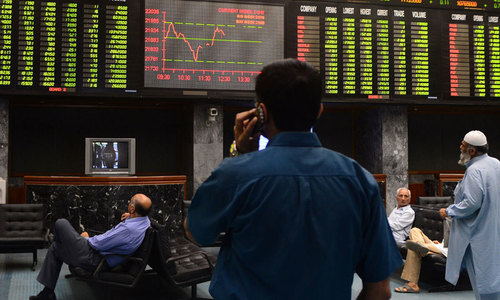Stocks plunge at PSX as KSE-100 sheds 908 points on US Senate bill proposing sanctions

Stocks fell nearly 3 per cent on Wednesday while the rupee dropped to a record low, as investors feared a US Senate bill that is seeking to impose sanctions on the Afghan Taliban could be extended to Pakistan.
After only a day of breather, sellers were back in action, which was also triggered by anxiety regarding the rupee as the KSE-100 shed 908 points on Wednesday to close at 44,366.74, down 2 per cent.
The index reached a high of 45,342 intraday while the low was 43,975, or 2.9pc, swinging volatile.
While macro concerns continue to be on the minds of investors, Wednesday saw the rupee hitting its lowest ever at Rs170.27 against the greenback, weighed down by high demand for the dollar and the situation in Afghanistan, analysts said.
Read more: US senators seek assessment of Pakistan’s role in America’s Afghan debacle
Raza Jafri, executive director at Intermarket Securities, said a bill tabled in the US Senate, backed by 22 senators, which seeks to investigate Pakistan's role with respect to the Afghan Taliban over the past 20 years was the main reason behind the fall today.
"If something is found, they plan to impose sanctions on Pakistan and that is a taboo word and it causes panic. The sentiment was already weak and then it caved in," Jafri said.
But, according to Jafri, this was just an initial reaction and the chances of the bill actually getting passed are quite low which is why the market did see some recovery after the early plunge today.
"I don't think this is the start of a bear run," he said.
Samiullah Tariq, head of research and development at Pakistan Kuwait Investment Company Pvt Ltd, had similar comments on the development, saying that the plunge appeared to be related to the US Senate bill seeking to impose sanctions on the Afghan Taliban and which could extend to Pakistan.
“Dollar parity is consistently rising as demand for the dollar is high due to the current account deficit, and the Afghan situation is also adding pressure,” he said.
The State Bank of Pakistan (SBP) had indicated earlier that the dollar could appreciate during the current financial year due to an expected higher current account deficit.
Last week, the central bank amended the prudential regulations to slow imports which swelled to more than $6 billion in August alone.
The SBP said the targeted step would help moderate demand growth in the economy, leading to slower import growth and thus supporting the balance of payments.
With input from Reuters














































